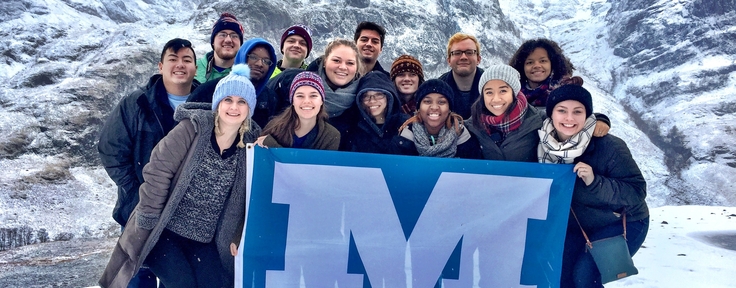For Parents

-
Is your student interested in studying abroad? If so, that’s a great sign! According to a 50-year study by IES Abroad …
- 96% Indicated that studying abroad increased their self-confidence
- 94% Stated that the experience influences their interactions with people from different cultures
- 95% Stated that it has had a lasting impact on their view of the world
- 90% Said that studying abroad influenced them to seek out a greater diversity of friends
- 87% Claimed that studying abroad influenced subsequent education experiences
- 76% Reported that they acquired skill sets that influenced their career path
This shows that a study abroad experience is one of the best investments in a student’s education. But it can still be a daunting idea—concerns about everything from finances to safety can become overwhelming.
That’s what the Center for International Education (CIE) is for. The CIE is here to provide resources and assistance to students and parents to help make sure a student’s study abroad experience is as rewarding as possible.
-
-
Understanding the Academics
Students should work with their academic advisor and the CIE to plan-ahead for a study abroad experience. Since there are a lot of “moving parts” with a study abroad experience, it is best to communicate with their advisor about which classes to take to ensure they will receive the appropriate credits needed to graduate on-time. A good rule-of-thumb is, “The longer the study abroad experience, the longer the process.”
The best thing a student can do is stay in good academic standing (3.0+ GPA) and communicate often to their advisor.
The CIE recommends that students alert their academic advisor in their freshman or sophomore years to let them know they would like to study abroad.
Understanding the Expenses
For the majority of Millikin’s semester-long exchange programs, a student’s financial aide package and scholarships will remain the same during their semester abroad. Millikin also offers scholarships through endowed funds to help students fund their programs. Students can apply for these scholarships when they apply to their program of choice. The CIE also works with organizations like Diversity Abroad and
For most semester-long exchange programs, students and families will be responsible for the cost of housing and everyday living expenses (Through Millikin's London Program, students' housing is included in their Millikin bill. These expenses vary by location. Studying in Paris, for instance, will likely be more expensive than studying in a less-expensive city. The CIE recommends that students and families start saving early and anticipate the following expenses:
-
Food
-
Souvenirs
-
Additional Travel
-
Passport and Visa Fees
-
Airfare
-
School Supplies
-
Clothing
-
Transportation expenses (Subway or bus cards)
-
Emergency funds (including medical expenses)
-
SIM Card/Phone expenses
-
-
Your Student is Going Abroad! Now What?
Packing & Preparing:
Students attending a semester abroad will need to apply for a student visa. Since every country has different criteria and requirements, it is important for students and families to research what they need and ACT EARLY to secure their visa. Students will be able to apply for a student visa with that country's consulate as soon as they are accepted into the program. It is wise to have worked to secure necessary paperwork (i.e., passports, proof of insurance, bank statements, etc.) before a student is accepted into the program so you do not need to "scramble" to receive all necessary documents.
Once a student has selected their program, received their visa, and booked their flight, congratulations! Now it's time to start packing. When it comes to preparing for a study abroad experience, it's always smart to pack light since students will accumulate souvenirs and more items they will want to take back with them. Some things the CIE recommends packing include...
-
Region-appropriate wall plug adapter & transformer
-
Weather-appropriate clothes
-
Comfortable walking shoes
-
Extra pairs of socks and undergarments
-
Laptop/tablet
Staying Safe
Whether traveling alone or in part of a travel course, Millikin has steps in-place in case of emergencies. Faculty members leading travel courses are given a risk and emergency protocol. Millikin's Public Safety discusses important safety measures while traveling abroad in a Pre-Departure orientation mandatory for all students participating in international travel.
It's important to note: while many countries are just as safe as the U.S., new environments often offer new hazards. To ensure safety when traveling as part of a semester abroad, Millikin recommends...
-
Travel with other people instead of alone—especially at night
-
Use caution when talking to strangers
-
Stay away from dangerous areas
-
Do not drink to excess and avoid illegal drugs
-
Follow the laws and customs of the host country.
The CIE receives regular updates from the State Department and does not send students anywhere considered to be a "high risk" location. The CIE recommends students and parents register to join the State Department's free Smart Traveler Enrollment Plan (STEP) before departure to receive alerts about events including natural disasters and terrorist attacks.
Getting in Contact
Students who are interested in studying abroad should fill out the study abroad interest form once they start classes. They are also welcome to visit the CIE in UC 122 or contact CIE@millikin.edu any time for more details!
-